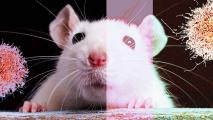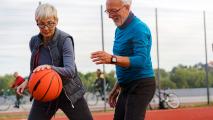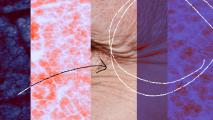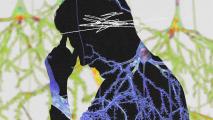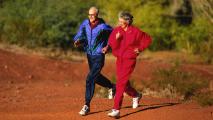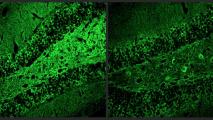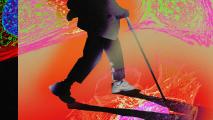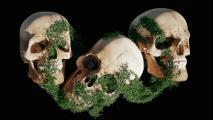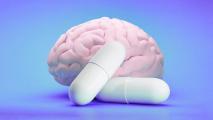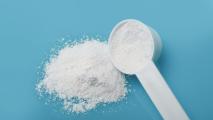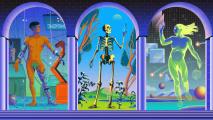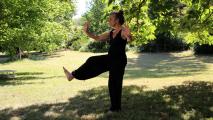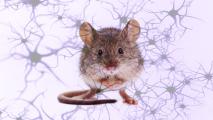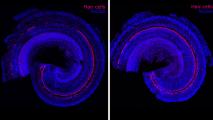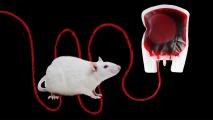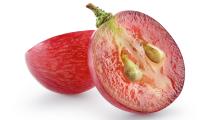Field: Aging
The exciting research that may cure Parkinson’s
GeneCode is developing a drug it hopes won't just alleviate Parkinson's symptoms but also protect and restore patient's neural health.
Last century, we extended our lives. This century, we need to shorten our deaths.
We are living longer lives, while also spending more years sick than ever before — but there are ways to close the lifespan-healthspan gap
One shot recreates younger immune systems, in mice
An antibody treatment designed to revitalize an aging immune system delivers “surprising” results in elderly mice.
How frontotemporal dementia, the syndrome affecting Wendy Williams, changes the brain
In contrast to Alzheimer’s, in which the major initial symptom is memory loss, FTD typically involves changes in behavior.
New “spiral” contact lenses let you see up close and far away
New spiral-shaped multifocal lenses bend light in a way that corrects problems seeing up close and far away, even in poor lighting.
Anti-aging pill for senior dogs is now in clinical trials
An anti-aging pill for senior dogs now in clinical trials might lead to treatments that extend human lives, too.
One-and-done anti-aging treatment “rejuvenates” old mice
CAR-T cells that have been modified to target senescent cells could be a one-and-done anti-aging treatment.
How does Alzheimer’s disease erode memory? New findings on risk gene offer insights
The strongest genetic predictor of Alzheimer's disease is a variant of a gene called apolipoprotein E. Researchers are discovering why.
The most damaging exercise myth
It's a common belief that it's normal for adults to be less physically active as they age. This might be the most pernicious exercise myth.
Research: inflammation and mortality may be caused by low “psychological well-being”
Researchers looked at the link between life purpose and mortality and found that people who felt they had no purpose in life tended to die earlier.
Why do women live longer than men?
Women tend to live longer than men around the world – but the gap life expectancy is not a constant. These stats tell the story.
Biggest science prize in history aims to extend human healthspan by a decade
Do humans have an ethical obligation to “die young”? Maybe not in the way you think, says bioethicist Raiany Romanni.
First anti-aging drug for dogs nears approval
The FDA is a major step closer to approving biotech company Loyal's LOY-001, the first anti-aging drug for dogs.
Study finds exactly how long people want to live: it isn’t forever
Most people prefer a shorter life if they have dementia, chronic pain, or are a burden to their families.
Molecule reduces inflammation in Alzheimer’s models
A potential new Alzheimer’s drug represses the harmful inflammatory response of the brain’s immune cells, improving cognition in tests.
To stave off Alzheimer’s, protect your brain’s mitochondria
Mitochondria are crucial for memory preservation and are emerging as key players in the fight against Alzheimer's.
Life’s stages are changing – we need new terms and new ideas to describe them
The arc of adult development has changed over the past several decades, in ways that our psychological theories are still catching up with.
Almost everyone fears death — but not in the same ways
Fear of death may be the most primal, normal human fear, but it's one we all experience differently.
4 ways to promote neurogenesis in your brain
Research from the 1960s proves creating new neurons as adults is possible, and modern-day research explains how to promote it.
ADHD drugs could alleviate symptoms of Alzheimer’s
Scientists reviewed 40 years of clinical studies that assessed the effects of NA-targeting drugs, such as certain ADHD drugs, on Alzheimer’s.
Aging is complicated – a biologist explains why no two people or cells age the same way
While some people may be older in chronological age, their biological age might be much younger. A biologist explains why.
One shot of the klotho protein boosted memory in old monkeys
A single shot of klotho, a protein linked to longevity, improved the working memory of older rhesus macaques.
Sooner or later we all face death. Will a sense of meaning help us?
An awareness of our mortality can, paradoxically, move us to seek – and, if necessary, create – the meaning that we so desperately crave.
How intestinal viruses could help you live to be 100
People who live past age 100 have a greater diversity of bacteriophages (that is, viruses that infect bacteria) in their intestines.
Taurine appears to reverse aging in animals. Can it do the same for us?
Animals given taurine lived longer, healthier lives, suggesting that the compound may also increase human longevity.
Older people were 3x stronger at the end of this science-backed 8-week program
But what if you’re in your 60s, 70s, 80s or 90s? Is it “too late” to build muscle and fight sarcopenia? Here’s what the research says.
Rapamycin: The unlucky history of the most powerful anti-aging drug
When rapamycin research was revived, it was found to have both anti-cancer and anti-aging properties. Here's what researchers say today.
The vicious cycle of food and sleep
More than a third of Americans don’t log enough hours in bed, provoking serious health impacts. Diet is an important, under-recognized reason.
Emotions get better with age
As people grow older, they gain greater control of their feelings. How do they do that — and can they teach young people a thing or two?
Dementia patients are “rallying” just before death. Scientists want to know why.
New research into terminal lucidity could revolutionize our understanding of dementia — and maybe even give us a way to reverse it.
Dignity therapy: Making the last words count
Guided conversations with the terminally ill are popular with patients, families and doctors. But are they truly beneficial?
Alternative funeral options are changing how we honor our dead
A small, yet growing number of people are starting to choose funeral options outside traditional burial or cremation.
“Sunshine Calls” help depression and loneliness, study finds
A trial of “Sunshine Calls” found that the empathy-based phone calls helped reduce depression symptoms in older patients.
Study: If there is a maximum human lifespan, we’ve yet to reach it
The current record for longest life is likely to be broken in the coming decades, according to a new study on the maximum human lifespan.
Death: how long are we conscious for and does life really flash before our eyes?
When does our consciousness disappear? And are we really flooded by memories in our final moments? Scientists hope to find out.
A single injection of gene therapy made old mice live 7% longer
Biotech startup Rejuvenate Bio says it has extended the lives of elderly mice by 7% using a technique called “partial reprogramming.”
Just a few short bursts of physical activity each day might yield huge health benefits
Researchers tracked 25,241 non-exercisers wearing accelerometers to find out of brief bursts of activity lowered their risk of dying.
To avoid the worst effects of aging, we might need to exercise harder than we thought
To avoid one of the worst side effects of aging—bone, joint, and muscle pain—we might need to exercise a lot harder and more often.
Three reasons “you” won’t return after this life
Entire religions are constructed around theories of an afterlife, but former monk Stephen Batchelor lists three reasons you won't come back.
Synthetic cartilage is now stronger than the real stuff
Using a heating process, Duke researchers have created a synthetic cartilage hydrogel that can outperform the real thing.
Mouse embryos with beating hearts have been created entirely in the lab
Researchers at the Weizmann Institute of Science have developed mouse embryos, complete with organ structures, purely from stem cells.
Transhumanism: Savior of humanity or false prophecy?
While many of the technologies upon which transhumanists base their dream are real and world-changing, they have major limitations.
What ever happened to the first cryogenically frozen humans?
For decades, people have arranged to freeze their bodies after death, dreaming of resurrection by advanced future medicine.
Jeff Bezos is looking to defy death – this is what we know about the science of aging
Will Bezos’s company succeed in extending the human lifespan? Maybe. But we can all benefit from studying aging.
How child mortality fell from 40% to 3.7% in 200 years
The collapse in child mortality rates is a testament to the tremendous benefits of scientific, technological, and economic progress.
Large study of 20,000 cats and dogs could help pets live longer
Mars Petcare has announced the opening of a massive biobank to study aging and pet diseases.
People who read live longer than those who don’t, Yale researchers say
A study by Yale researchers finds that reading books in particular returns cognitive gains that increase longevity.
10-second balance test is a powerful predictor of death for older adults
Adults aged 51-75 who were unable to balance on one foot for ten seconds had an 84% higher risk of death than their peers who could.
Do optimists really live longer? Here’s what the research says
Research shows if you cultivate a more optimistic mindset, you might further increase your chances for a long life.
The age reversal tech that billionaires are banking on
How long can a human being not only live but thrive? A race to find out involves some of the biggest names (and bank accounts) in tech.
Brain infusions from younger mice revive memory in older ones
Stanford researchers have found that an infusion of cerebrospinal fluid from young mice improves the memory of old ones.
Mutations in 16 species reveal clues to human aging
A surprising pattern in how often mammal cells undergo somatic mutations could be a boon to longevity research.
Death: how long are we conscious for and does life really flash before our eyes?
Seeing one’s life flashing before one’s eye might be our ultimate attempt – however desperate – to find meaning in our lives.
Reversing hearing loss with regenerative therapy
MIT spinout Frequency Therapeutics’ drug candidate stimulates the growth of hair cells in the inner ear.
Your pet dog could help people live longer, healthier lives
The Dog Aging Project is studying tens of thousands of dogs in the hope of helping pets and people live longer, healthier lives.
Anti-aging isn’t a scam, but immortality almost certainly is
A new biotech firm with $3 billion in funding has announced plans to combat aging. But what does that mean for human life span, exactly?
Why calorie restriction may be the key to a healthier life
A new study suggests that people appear to benefit from a moderate calorie restriction the same way we know many animals do.
What HIV & Amish DNA can tell us about staying healthy longer
Northwestern University has launched a new longevity research center where scientists will look for ways to combat biological aging.
Why do “young blood” transfusions help aging mice?
Young blood transfusions may combat signs of aging in older mice by increasing the production of a specific protein: Klotho.
A chemical in grape seeds extends lives of mice by 9%
A chemical in grape seeds extended the lives of old mice, made young ones healthier, and helped chemo drugs shrink tumors in a new study.
The science behind “anti-aging” diets
A recent study reviewed the efficacy of popular diets that claim to have anti-aging benefits.


